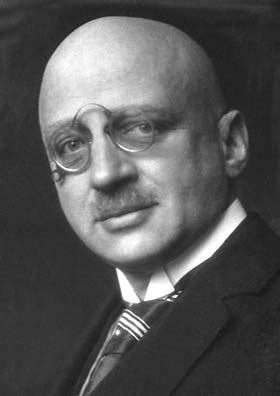| Fritz Haber | |
|---|---|
 |
|
| Chemist | |
| Specialty | Haber-Weiss reaction, fertalizer, Haber process, chemical warfare |
| Born | Dec. 9, 1868 Breslau, Prussia |
| Died | Jan. 29, 1934 (at age 65) Basel, Switzerland |
| Nationality | German |
Fritz Haber is one of Germany’s most famous chemists. He won the Nobel Prize for Chemistry for his work in synthesizing ammonia. Ironically, the Nobel Prize is mostly associated with peace and Haber’s work in synthesizing ammonia helped contribute to the development of new explosives. In the agricultural world, the synthesizing of ammonia aided in fertilizing crops to a much better degree. His work in the field of chemical weaponry would make him a notorious historical figure as well.
Haber’s Early Life
Haber was born in Breslau, Prussia, as part of an upper-middle class family and the son of a merchant. As a young man, he worked for his father’s business, a venture that was involved with chemistry. This is where Haber first gained his insights into chemistry and what it could do. Haber also worked at the Swiss Federal Institute of Technology where he learned a bit more about the sciences.
Haber combined his practical work experience with educational pursuits. He enrolled in the University of Heidelberg and also continued his studies at the University of Berlin. The education he received served him well as he was able to make many new discoveries in the area of ammonia synthesizing.
Working with Ammonia
From 1894 to 1911, Haber worked at the University of Karlsruhe. Among the research work he was involved with was a project known as the Haber process. The Haber process was actually a joint venture between Haber and his colleague, Carl Bosch.
The process entailed crafting a catalytic formation of ammonia drawing it from hydrogen and also atmospheric nitrogen. This process took place under conditions defined as being both high pressure and high temperature.
The end result of the process yielded results that had huge implications throughout several different industries. Basically, upon the successful completion of the process, it was no longer necessary to acquire nitrogen products from natural deposits. Sodium nitrate was one natural product that was needed for the extraction of the nitrogen. Sodium nitrate was not found in many countries and it had to be imported. The new process eliminated the costly nature of mining and importing. Now, explosives, chemical feedstock, and fertilizers could be made much cheaper and even quicker.
The Nobel Prize for Haber
Thanks in large part to his work in the Haber process, Fritz Haber received the Nobel Prize in Chemistry. The Haber process was not the only innovative research project the man would be successfully involved with. He worked on research projects centered on separating the gold from ocean water, studies into electrochemistry, free radical research, and more.
So appreciative was the German science community over the work Haber had done, in 1953, the Kaiser Wilhelm Institute for Physical Chemistry and Elektrochemistry was renamed the Fritz Haber Institute of the Max Planck Society.
Haber and WWI
As many military historians will note, chemists were in great demand during World War I. The reason for this was because Germany was reliant of weapons of mass destruction as part of its military campaign. In particular, the weapons used were chemical and gas weapons designed to kill the enemy via asphyxiation.
Haber was heavily involved with the development of these weapons. Most infamously, Haber eventually gained the moniker Father of Chemical Weapons. The type of chemical weapon he was involved the most was chlorine gas. He did not only make the actual gas weapons. His work also involved developing defensive gas masks with special filters.
Haber justified his work in chemical weapons through stating that his goal during warfare was to serve his country. He did so in the capacity of a chemist working in areas related to weapons development. For his achievements in chemical warfare, he was promoted to the rank of captain. This was a very high rank for a scientist to achieve.
Haber’s Last Years
After the end of the war, Haber invested a great deal of this time researching the means in which gold could be drawn from seawater. His health was not always good and he suffered a heart attack in the early 1930s. In 1934, he finally succumbed to heart failure.